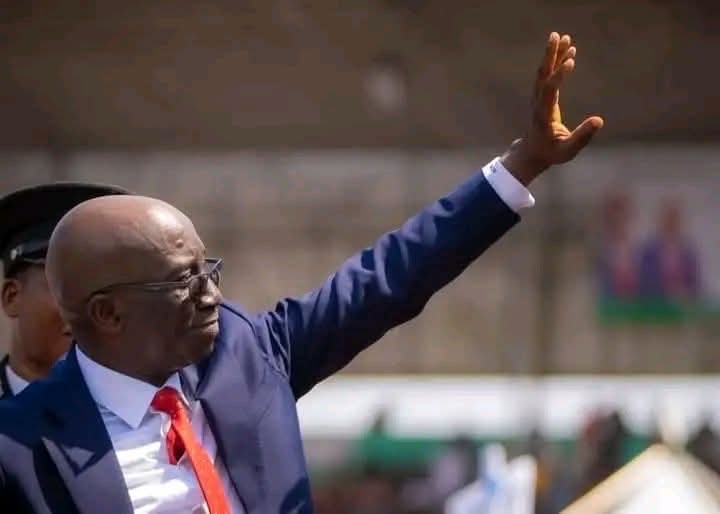As the September 21 Edo State governorship election approaches, various political parties and their candidates participating in the election have continued to display their campaign slogans as seen on various billboards and media platforms across the state.
Slogans in electioneering pass a concrete message to supporters and electorates to easily acclimatize with a particular candidate without even knowing the manifesto or the agenda of the candidate.
A slogan is like a candidate’s perspective or his personality trait that will shape his idiosyncratic factor on how he will run his government or deliver on promises when he or she gets into office.
The People’s Democratic Party (PDP) governorship candidate, Dr Asue Ighodalo, is known with a popular slogan “E GO DO AM”. Loosely translated, this means “HE WILL DO IT”. This slogan by the PDP candidate is a way of simply telling his supporters and the electorate that he will deliver on every promise he has made to the people of Edo State if he is elected governor. The slogan attached to Asue Ighodalo is also a way of telling the Edo people to trust him and that he will do everything he has said and will leave no stone unturned to take Edo State to greater heights.
Asue Ighodalo’s “E GO DO AM” is one of the popular slogans, if not the the most popular, currently in the state as everyone – the elderly, men, women, youth and children – can easily relate with the slogan wherever you go across the three senatorial districts of Edo State.
Also, the All Progressives Congress (APC) governorship candidate, Senator Monday Okpebholo, has a slogan that reads “SMALL YARN, MORE WORK”. There is also the English version of the slogan that says “LESS TALK, MORE WORK”.
Somme observers have said the slogan sits well with the personality of the APC candidate, who has been widely criticised for being rather taciturn. Senator Okpebholo is perceived as not being outspoken and also not engaging with the people of Edo State as someone that is flying the flag of the main opposition party in the state which is supposed to be putting the ruling party on its toes.
The personality trait of Senator Monday Okpebholo is what many believe has led to the slogan “LESS TALK, MORE WORK” that the APC is spreading around the state as seen in most of their campaign billboards. What the APC is trying to tell Edo people and the electorate is that their candidate might not be outspoken but he will hit the ground running with actions rather than spending much time talking.
The Labour Party governorship candidate, Barr. Olumide Akpata, started out with the slogan “WHO IS YOUR GUY?”, which was borrowed from the song by a popular Nigeria singer, Spyro, titled “Who is your guy?” By that, the Labour Party candidate is trying to say that he is the man of the people and a friend of the masses. Akpata is telling the people of Edo State that he is the man and as such he understands the pain of the people, thereby saying that he is in the best position to deliver on his promises being their guy (friend).
No doubt, Akpata’s slogan “WHO IS YOUR GUY?” is one of the popular slogans in the state. It has also been used for his campaign jingles on radio and a lot of people easily relate with it and dance to it whenever it is played across the streets or at campaign venues.
Similarly, the candidate of the African Democratic Congress (ADC), Derek Izedonmwen, has a slogan “READY TO SERVE”. The slogan is self-explanatory. It is the candidate saying, “I am here, send me.” In other words, the candidate is assuring Edo people of his readiness to be the people’s servant-leader who will serve the people’s interest, not one cast in the mould of masters who lord it over the people who elected them.
The ADC gubernatorial candidate’s slogan “READY TO SERVE” has messages such as: “I am here to change a broken system”, “I stand on the shoulders of great giants”, “Our state belongs to us all”, etc. By “READY TO SERVE,” Izedonmwen says he is prepared with workable plans, unlike accidental leaders foisted on the people by selfish interests, and who can’t hit the ground running due to poor preparation.
The candidate of the Young Progressive Party (YPP), Paul Okungbowa, has a slogan, “BIG MAN NO GET OUR TIME”, which can be seen in various billboards across the city.
The YPP gubernatorial candidate, by this slogan, implies that the elite do not have the interest of the masses at heart, that the elite are only after their selfish interest and those of their friends and business associates.
Okungbowa is using this slogan to tell Edo people that the moneybag politicians don’t have time for the common man and are not perturbed by the challenges that the common people face. They are in government for themselves and their friends and associates and not for the people.
Slogan is a very important strategy in electioneering practices because it helps the people (electorates) to have an easy understanding of a perception of a particular candidate, his message and how he intends to govern the state when he or she is elected into office.
While some political parties and their candidates’ slogan have continued to ring a bell in the minds of Edo people, some political parties out of the 17 political parties jostling to sit at the helm of affairs at Osadebey Avenue are yet to be identified with a slogan despite the election being a few weeks from now.
Observers, however, say these political parties that are yet to articulate a slogan or that have not as yet popularised whatever slogan they have can still do that within the remaining few weeks before the election as that might still sway voters to themselves.


